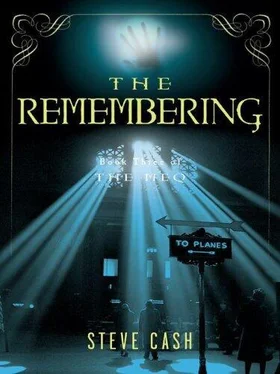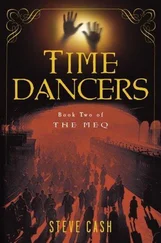Just then, I caught a glimpse of two figures kneeling in the snow between two huge spruce trees. They were both aiming what looked to be rifles directly at the glass walls of the Jewel Box. Without hesitation, I reached in my pocket for the Stone and held it in my palm, then raised my arm. “Hear ye, hear ye, now, Giza,” I said in a low, even drone. “Lo geltitu, lo geltitu . Go like lambs, now. You will forget. Ahaztu! ”
The two figures rose slowly and turned around to go. They both had blank, dull expressions on their faces. They were only boys, two boys about my size, and the rifles were only BB guns, which probably would not have had the power to penetrate the sturdy glass. Nevertheless, they were threatening to vandalize the Jewel Box, and I could not allow that. The boys dropped their guns in the snow and walked away without a word.
I glanced at Carolina and caught her trying to stifle a smile. I looked at Antoinette. Once again, her mouth hung open and she was staring at me. She mumbled something in French, then switched to English. “How … how did you … how is that possible?”
I glanced once more at Carolina, who had her eyebrows raised, waiting and wondering how I would answer. I decided the truth was the best and simplest reply. “I don’t know, Antoinette.” I took a step or two toward her. “There are only five of us who can do it. None of us know the secret. We never have.” I paused and looked into her eyes, which reminded me so much of Emme. “Did your mother never mention this … this ‘ability’?”
“Yes,” she said softly. Her eyes looked away for a moment, as if she was embarrassed. “I … I must confess I never quite believed her.”
“Believe her,” Carolina interrupted. “Believe every word.” She folded her arm inside Antoinette’s arm and turned in the direction of Lindell Boulevard. “Come on, my dear, let’s go home and build a big fire in the fireplace. I will tell you a few stories of my own, and I promise you, you can believe every one of them.”
Later that night, long after dinner, Carolina caught me standing in the closet of Jack’s bedroom. I was rubbing a thin coating of neat’s-foot oil into Mama’s glove. The old leather and stitching soaked it up. I pounded my fist in the pocket and thought of the last time I played catch with Papa. I was not aware Carolina was in the room and watching me.
“Your mama made that for you, didn’t she, Z?”
I turned around, still wearing the glove on my hand. “Yes,” I said. “It was the only one she ever made.”
“What did you do for a baseball?”
“My papa made two.”
“Do you still have them?”
“The first one was destroyed. The second served another purpose.” I reached into my pants pocket and withdrew the Stone. “This was inside Papa’s baseball.”
Carolina looked hard at the pitted, egg-shaped black rock that is the Stone of Dreams. “Z … may I hold it? Is that allowed?”
I laughed and said, “There are no rules, Carolina. Of course, you may hold it.” I gave her the Stone.
She held it gently in her hands and examined every detail. “It is heavier than I expected.”
“Yes, and there used to be jewels embedded in the rock at four different points — a blue diamond on top, a star sapphire on the bottom, and lapis lazuli and pearl on the sides.”
She continued to stare at the Stone. She seemed entranced, almost like a little girl. Her hands were thin, blue-veined, bony, freckled, and blotched, but her long fingers were graceful and beautiful to watch as she turned the Stone over and over. “What do you suppose it really is, Z?”
“I don’t know. I truly don’t know what it is or from where it came.”
“It feels old,” she added, handing it back to me.
“Yes,” I said, then let my eyes settle on the Stone of Dreams and paused a moment, thinking of all the ones who had carried it before me. “Older than you can imagine.”
Carolina stood silently as I placed Mama’s glove in the shoe box where Jack, and later Caine, had always kept it. I put the shoe box back on the shelf and closed the closet door. In a soft voice, she asked, “Z, do you remember the day in Forest Park when you first told me you were … different than me? Do you remember what you did to prove it?”
I searched her eyes, but couldn’t tell where she was going. “Yes,” I said, hesitating. “I cut myself with a knife across the forearm. You were horrified and begged me to stop. I told you to wait and watch what happens.”
She took hold of my hand and led me toward the hallway. She ran her fingers over my knuckles and wrist and up my arm to the elbow. “You healed in seconds, and in minutes your arm was smooth and unblemished. There was nothing — no red lines, no scars. And there are no scars still.”
She let go of my hand and we turned to leave the bedroom. As I switched off the light, I said, “Oh, yes, there are. You just can’t see them.”
Antoinette surprised Carolina again by announcing she wanted to move back to St. Louis and transfer to Washington University and study literature, if they would accept her. Carolina was overjoyed and quickly made a few telephone calls to some old friends. Antoinette took a few tests, which she passed easily, and within days she was enrolled as a student in Washington University for the spring semester. Two weeks later, on a cold, blustery Saturday afternoon in the middle of January, the three of us were sitting in the kitchen discussing whether Antoinette should concentrate on English or French literature. Suddenly the back door to the kitchen burst open and Star and Willie stood in the doorway.
Star locked eyes with Carolina. Although they had exchanged letters throughout the war, they hadn’t seen each other since it began. She was wearing a long wool coat with a fur collar turned up. She was forty-four years old and looked exactly like Carolina at that age. Her cheeks were flushed and her eyes were bright. The tiny gold flecks sparkled in the light. “Mama,” she said, running over to Carolina and embracing her. Carolina nearly disappeared inside the coat, but I could hear her say quietly, “Oh, I missed you. Oh, how I have missed you.”
Willie Croft looked remarkably well, and a little silly. On his head, with the earflaps pulled down and covering his ears, he wore a multicolored, cone-shaped, knitted wool cap. I couldn’t help but laugh. Willie ambled over to me in his peculiar gait and smiled. “Peru,” he said, then removed the cap and ran his hand through his hair, which had thinned and become more gray than red.
“Peru?” I asked. “What do you mean, Willie?”
“The cap, Z. The bloke who sold it to me told me it was Peruvian — from the mountains north of Cuzco. Quite handsome, don’t you think?”
“Quite,” I said. I laughed again and we shook hands vigorously.
Willie looked me up and down. “It’s good to see you, Z.”
“It’s good to see you, too, Willie … more than you think.”
Star let go of Carolina and turned to give me a big hug. “I didn’t know you would be here, Z. This is wonderful.”
“Yes, it is, Star,” I said, hugging her tightly. I saw Antoinette still sitting at the table and watching the homecoming with a wide smile. I asked Star if she had ever met Antoinette Boutrain.
“No,” Star answered. She looked down at Antoinette and extended both hands. “But I’ve heard all about her from Jack.”
Antoinette took hold of Star’s hands and stood up. “And I’ve heard all about you,” she said. “Since I was a little girl.”
At that moment there was a loud banging on the kitchen door, then a man shouted, “Someone open the door! Hurry!”
“That would be Caine,” Willie said, opening the door and letting in a rush of cold air.
Читать дальше












